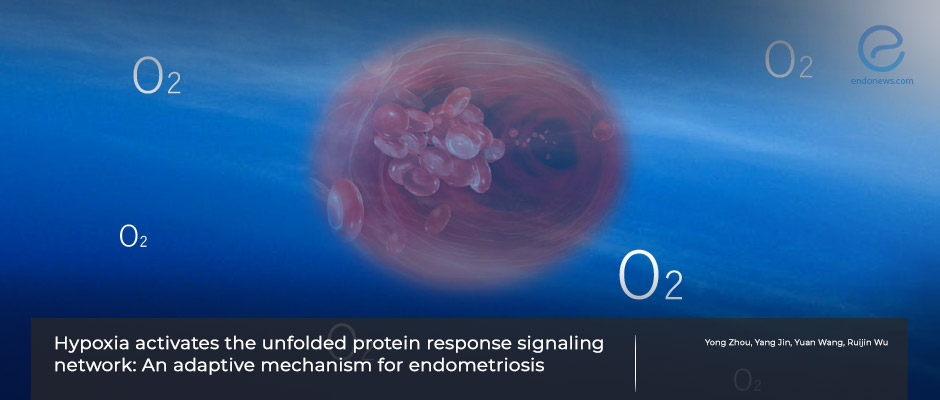Hypoxia and endometriosis: A review of mechanisms
Mar 3, 2023
"Hypoxia-induced unfolded protein response" in endometriosis might be a potential therapeutic target
Key Points
Highlight
- Hypoxia-induced "unfolded protein response" is a potential mechanism for the survival of ectopic endometrial cells in endometriosis and could be targeted by drugs for treatment.
Importance
- The interaction between the "unfolded protein response" and "hypoxia-inducible factor-HIF" pathways under hypoxic stress forms a highly correlated regulatory network that contributes to the viability, neovascularization, and invasiveness of ectopic endometrial cells in endometriosis.
What’s done here
- This paper is a review study on the role of hypoxia in endometriosis pathogenesis.
Key results
- Hypoxia in endometriosis leads to the upregulation of HIF-1, which triggers the production of molecules that promote angiogenesis and cell adhesion.
- Hypoxia also causes endoplasmic reticulum stress and activates the"unfolded protein response" pathway to result in viability, neovascularization, and invasiveness of ectopic endometrial cells.
- The "unfolded protein response" and HIF pathways interact with other hypoxia-independent pathways to form a highly correlated regulatory network.
- The "unfolded protein response" has the ability to reduce the accumulation of unfolded proteins and improve correct protein folding, restoring normal physiological functions of cells.
- When the "unfolded protein response" pathway becomes active by endometriosis, the viability, neovascularization, and invasiveness of ectopic endometrial cells increase.
- Progesterone can increase the expression of "unfolded protein response"-related genes (such as CHOP and TRIB3), to decrease the invasiveness, whereas estrogen can suppress "unfolded protein response"-induced apoptosis.
Lay Summary
Various mechanisms have been suggested to explain the development of endometriosis lesions. One of these is hypoxia, which can induce changes in endometrial cells, but the exact mechanism is not yet clear. Zhou et al from China wrote a review paper about how hypoxia contributes to the disease. It was published in the October 2022 issue of the journal Frontiers in Endocrinology (Lausanne).
Lack of oxygen in bodily tissues is a pathological phenomenon called hypoxia, which can lead to cellular malfunction and ultimately endanger life. The body's reaction to hypoxia is significantly regulated by hypoxia-inducible factors (HIFs), which activate a number of adaptive processes to support cell survival and proliferation. Continuous hypoxia in endometriosis causes the upregulation of HIF-1, which in turn triggers the production of a number of molecules that encourage angiogenesis and cell adhesion.
The endoplasmic reticulum is a critical organelle responsible for protein translation, folding, and modification. Oxygen is necessary for protein folding, and as a cause of disruptive protein folding due to hypoxia, misfolded proteins accumulate. This leads to endoplasmic reticulum stress, which activates the "unfolded protein response" signaling network to restore intracellular environment homeostasis. The "unfolded protein response" is mediated by glucose-regulated protein and three transmembrane protein stress sensors. The "unfolded protein response" can reduce the accumulation of unfolded proteins and improve correct protein folding, restoring normal physiological functions of cells. However, if stress persists, the signal will change from pro-survival to pro-apoptosis.
The "unfolded protein response" and HIF pathways interact with HIF-independent pathways, forming a highly correlated regulatory network under hypoxia stress. Endometriosis causes the "unfolded protein response" pathway to become active, which can increase the viability, neovascularization, and invasiveness of ectopic endometrial cells. Progesterone can increase the expression of "unfolded protein response"-related proteins (namely CHOP and TRIB3), which decreases the invasiveness of endometrial cells, whereas estrogen can suppress "unfolded protein response"-induced apoptosis.
It is concluded that hypoxia-induced "unfolded protein response" may be a potential mechanism for the survival of ectopic endometrial cells and could be targeted by drugs for treatment. Further research is needed.
Research Source: https://pubmed.ncbi.nlm.nih.gov/36339404/
endometriosis pathogenesis hypoxia unfolded protein response endoplasmic reticulum stress hypoxia inducible factor

